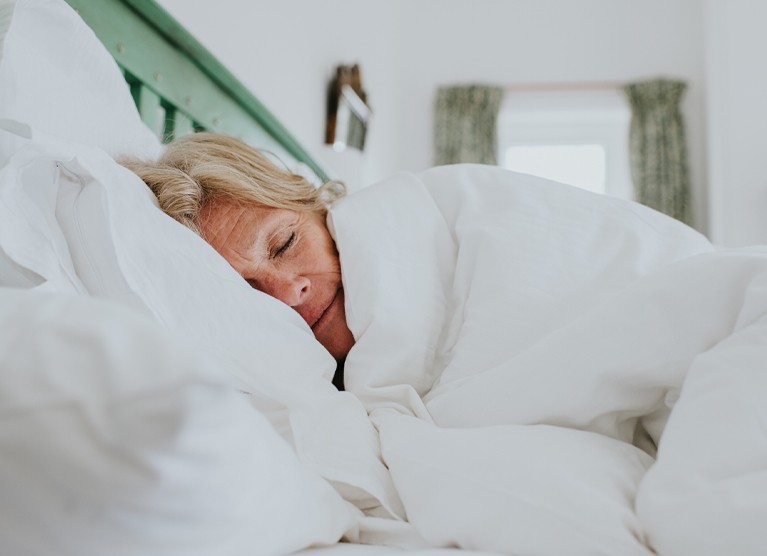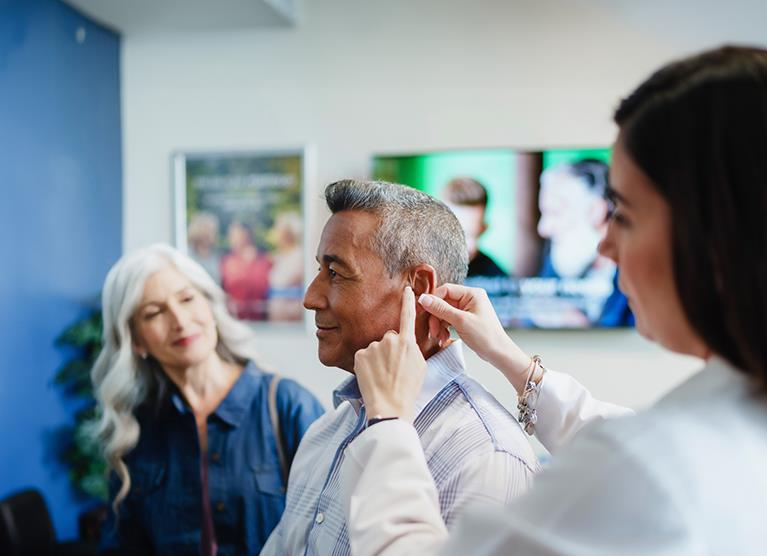Do I Have to Wear My Hearing Aids Daily?
The adjustment period might seem daunting if you’re a new hearing aid user, but here's what you need to know.
Should you wear your hearing aids every day? The answer is: yes! If you have hearing loss, you should wear both hearing aids daily to keep your brain healthy and sharp. Since many hearing aids aren’t completely waterproof, swimming or showering may be the only exception to wearing your hearing aids every day!
The adjustment period might seem daunting if you’re a new hearing aid user. However, understanding the importance of keeping them in will help you adjust faster and more comfortably. Read on to learn why you should wear your hearing aids daily.

What Happens If I Don’t Wear My Hearing Aids Every Day?
If you don’t wear your hearing aids daily, your brain might forget to hear certain sounds properly. This is called auditory deprivation. Auditory deprivation is when your brain receives consistent sound stimulation, as babies need to hear when developing their language skills.
If you only use your hearing aids occasionally, your brain might get used to the quiet and find it harder to understand sounds when you do wear them.
This can make listening more tiring and even make you want to avoid conversations. So, it’s important to wear your hearing aids regularly to keep your brain and hearing in good shape.
Is It Okay to Nap With Hearing Aids In?
No, it’s not recommended to nap or sleep with your hearing aids on. The reason is that the hearing aids often placed behind the ear have microphones inside the housing. When you sleep with them on, and they’re turned on, covering these microphones with a pillow or mattress can cause feedback or whistling noises from the hearing aids.
This disturbance isn’t good for your sleep quality or for anyone sharing the bed with you. Another problem is comfort. Custom-fit hearing aids and earpieces are made from various materials like hard acrylic, silicone or even titanium. When you lie on your ear for an extended period, it can become uncomfortable as these materials may press into the skin, creating pressure points.
Moreover, hearing aids are typically worn for more than a day at a time, and the materials aren’t breathable.
Taking them off at night lets your skin breathe and rest, and allows ear wax to naturally move out of the ear canal. For the sake of comfort and maintaining good hearing aid function, it’s best to remove them before sleeping.

Should I Turn My Hearing Aid Off at Night?
Yes, at night, you should turn off your hearing aids and store them somewhere safely. Here are some examples of how to do it correctly:
Storing Behind-The-Ear Hearing Aids
Most people using behind-the-ear (BTE) hearing aids understand the importance of keeping them clean and dry for optimal performance. Here are some options:
- In a drawer: Many people opt to store their hearing aids in a nightstand or sock drawer at bedtime. This keeps them nearby, away from sunlight, and reduces the risk of accidental damage from falling.
- In a hearing aid dehumidifier: Using a dehumidifier provides the benefits of a drawer while also ensuring the aids remain dry throughout the night.
It’s important to be mindful of potential risks to your hearing aids in certain locations:
- On the nightstand: Although convenient for accessibility, placing your hearing aids on the nightstand poses the risk of accidental falls, exposure to sunlight and dirt, and the possibility of misplacing batteries if removed overnight.
- In the car: Avoid leaving your hearing aids in the car. Extreme temperatures and uncontrolled humidity within a parked vehicle can harm the delicate electronics, leading to a loss of functionality.
Storing In-Ear Hearing Aids
People with in-the-ear (ITE) hearing aids have unique challenges in handling and storing them. Since these devices are smaller, they’re easier to lose and harder to dry out if they get wet.
When storing an ITE device, keep these points in mind:
- Ensure safety around pets and children: Store your device a few feet above ground level and securely out of reach when pets and children are present, as small devices and batteries may resemble candy or treats to them.
- Prevent loss with small storage options: Place your ITE device in a smaller container like a jewelry box or a well-ventilated cubby to prevent it from getting lost in a drawer. This keeps your device protected and easily accessible.
- Enhance protection while traveling: Consider using a hearing aid dryer and freshener for travel to keep your devices safe and dry. This lightweight, hard-shelled case includes moisture control, ensuring your hearing aids remain in good condition while you’re on the move.

What Percentage Of People Don’t Wear Their Hearing Aids Regularly?
Around 28.8 million adults in the United States require hearing aids. However, only 16% of individuals aged 20 to 69 who require them actually use them, as indicated by research conducted in 2021 by the National Institute for Deafness and Other Communication Disorders.
How Can I Wear Glasses With a Hearing Aid?
Many people find using both hearing aids and glasses challenging, but you’re not alone. Luckily, there are solutions to simplify things:
- Retention bands: Attach these to your glasses to keep them secure, which is especially useful for active lifestyles.
- Anti-slip hooks: These discreet hooks prevent your glasses from moving and potentially dislodging your hearing aids.
To ensure a smooth experience, follow these steps:
- Put on your glasses first, then your hearing aids.
- When removing them, take off your hearing aids first, followed by your glasses.
This sequence reduces the risk of your glasses catching on the hearing aid tubing, preventing any damage or loss.

We're Here to Help
Consistent use of your hearing aids can significantly enhance your daily life. Say goodbye to the strain of trying to catch every word in conversations or family events.
By incorporating our tips, you can maintain optimal hearing health. Additionally, remember that regular checkups are crucial for detecting any necessary adjustments to your hearing aids. Schedule an appointment with your local Beltone office today.

Take Online Hearing Test
Take our free at-home hearing loss test as a first step on your journey to better hearing.


